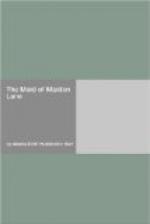“I have again made a fool of myself. I have now all kinds of unpleasant feelings; and when I left that good Doctor’s house I was well satisfied. His daughter is an angel. I praise myself for finding that out. She made me believe in all goodness; yes, even in patriotism! I, that have seen it sold a dozen times! Oh, how divinely shy and proud she is! I could not get her one step beyond the first civilities; even my eyes failed me to-night—her calm glances killed their fire—and she barely touched my hand, though I offered it with a respectful ardour, she must have understood:”—then he looked admiringly at the long, white hand and thoroughbred wrist which lay idly on the velvet cushion of his armchair; an exquisite ruffle of lace just touched it, and his eyes wandered from the ruffle to the velvet and silver embroidery of his coat; and the delicate laced lawn of his cravat.
“I have the reputation of beauty,” he continued; “and I am perfectly dressed, and yet—yet—this little Beauty seemed unconscious of my advantages. But I cannot accept failure in this case. The girl is unparagoned. I am in love with her; sincerely in love. She fills my thoughts, and has done so, ever since I first saw her. It is a pure delight to think of her.”
Then he rose, threw off his velvet and lace, and designedly let his thoughts turn to Arenta. “She is pretty beyond all prettiness,” he said softly as he moved about, “She dances well, talks from hand to mouth, and she gave me one sweet glance; and I think if she has gone so far— she might go further.” At this reflection he smiled again, and lifting a decanter slowly poured into a goblet some amber-coloured sherry; saying—
“I dare not yet drink to the unapproachable Cornelia; but I may at least pour the wine to the blue-eyed goddess, with the pearl necklace, and the golden hair;” and as he lifted the glass, a memory from some past mirthful hour came into his remembrance; and he began to hum a strain of the song it brought to his mind—
“Let the toast
pass,
Drink to the lass
I’ll warrant, she’ll prove an excuse
for the glass.”
It was remarkable that he did not take Arenta’s brother into his speculations at all, and yet Rem Van Ariens was at that very hour chafing restlessly and sleeplessly under insults he conceived himself to have received, in such fashion and under such circumstances as made reprisal impossible. In reality, however, Van Ariens had not been intentionally wounded by Hyde. The situation was the natural result of incipient jealousy and sensitive pride on Rem’s part; and of that calm indifference and complaisance on Hyde’s part, which appeared tacitly to assert its own superiority and expect its recognition as a matter of course. Indeed, at their introduction, Rem had affected Hyde rather pleasantly; and when the young Dutch gentleman’s opposition became evident, Hyde had simply ignored it. For as yet the thought of Rem as a rival had not entered his mind.




